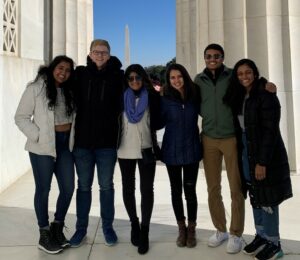Vikram Nandyala struggled with stuttering his entire life.
WSSA has enabled him to stop stuttering and learn to love to speak.
Vikram Nandyala is a natural-born storyteller. But at 24, the Washington, D.C., senior associate at a major international accounting firm has only been able to put the skill to wide use in the last two years. Previously, his stutter prevented him from expressing himself sufficiently to achieve his objectives.
Early Challenges
 Vikram knew as far back as age 4 growing up in Florida that his speech was disabled. It was then that he began seeing speech therapists thanks to his supportive and empathetic parents – his father had singlehandedly overcome a stutter of his own. However, any help he received focused on “accepting” his stuttering and never really helped cure it.
Vikram knew as far back as age 4 growing up in Florida that his speech was disabled. It was then that he began seeing speech therapists thanks to his supportive and empathetic parents – his father had singlehandedly overcome a stutter of his own. However, any help he received focused on “accepting” his stuttering and never really helped cure it.
“It wasn’t a positive experience,” he said. “We were so frustrated with the lack of success with therapy. We could not find the right solution.”
By the time he reached high school, new challenges emerged. He simply couldn’t talk in certain situations, and he could feel the impact.
A Barrier to Job Success
At college, he studied economics and information systems, eventually graduating to take a job with a major IT services firm. But his stutter was still holding him back. That’s when he did what plenty of other stutterers before him have done – typed “stuttering” into Google. One of the results was the Amazon listing for the book Stuttering & Anxiety Self-Cures by Lee G. Lovett, a co-creator of the non-profit World Stop Stuttering Association (WSSA) and the author of The Lovett Method, which forms the foundation of WSSA’s work.
Initially Vikram was skeptical about Lovett’s book despite the large number of rave reviews it had received. “Because of past experiences with stuttering ‘solutions’ you lose faith and become cynical,” he said.
Welcome Help from WSSA
But once he began reading, he was hooked. “And in the book, Lee mentioned free Skype lessons and I didn’t believe it. It seemed odd that the author of a good book would make time for this,” Vikram said. But he did indeed set up a virtual meeting with Lovett, who introduced Vikram to Prathusha Ravi, another former stutterer and certified coach in The Lovett Method, for additional instruction.
It was after the first session with both Lovett and Ravi that he realized the process was already working. He followed up by taking one of the first steps in the program: recording himself reading without a stutter so he could hear himself being fluent.
“My first thought was that this was something I could use for the rest of my life and I wish others could have access to it,” he said. “The average cost of speech therapy in other programs is ridiculously high and the cost of this one was so low. I felt I’d learned something way more valuable beyond the price.”
A Revolutionary Method
The Lovett Method, developed by retired attorney and philanthropist Lee G. Lovett as he fought his own battle with stuttering, focuses on stopping stuttering rather than convincing stutterers to accept the condition. Its methods are rooted in the concept of neuroplasticity – the ability of a person to change their own brain through training.
“Neuroplasticity is so interesting and hugely powerful,” Vikram said. “You are overcoming a physical obstruction that occurs due to a mental process. Changing your mindset is so powerful.”
Another significant benefit of the WSSA program Vikram noted is the Speech Anxiety Masters (SAM) program – online meetings that give stutterers a chance to practice their stop-stuttering techniques – known as “crutches” – in a safe space with kindred, empathetic spirits, including many EX-stutterers
“The value of SAM was monumental,” he said. “It elicited a part of me that I didn’t know existed – a strong, confident man who is capable of speaking at a high level. Without SAM, it’s tough to say whether or not I would have ever gotten over my stutter fully.”
Moved to Help Others
Eighteen months after he began the program, he was so adept at The Lovett Method that he passed WSSA’s Coach Training Program (which improved his speech even more) and was coaching others to help share the valuable lessons he’d learned. But that wasn’t the end of the positive benefits.

WSSA coach and ex-stutterer Vikram Nandyala, (2nd from the right) hanging out with friends in Washington, D.C. “I owe so much to The Lovett Method. There are 70 million people who stutter. WSSA will help many of them experience fluency. I just know it.”
“This has improved my life astronomically,” he said. “In my own career, I’m not afraid to take on speaking roles anymore and feel comfortable being a leader. Ordering food in a restaurant was initially onerous, but now I feel that it’s easy and I love doing it. And even beyond speech, I feel like the mind training exercises I learned can apply to anything like depression, anxiety and any other problems I may face in the future.”
A Love for Public Speaking
In addition, Vikram has landed his dream job with a major multinational accounting firm and has even been awarded for his humorous storytelling by his local chapter of Toastmasters International, a nonprofit educational organization that teaches public speaking and leadership skills.
“It felt superb to receive the award, and when I look back at my memories before The Lovett Method in juxtaposition with my life now, it’s day and night not only in terms of speech but also my overall happiness,” he said. “As a WSSA coach I cannot begin to describe the euphoria I feel when my stuttering student starts to make progress and experiences fluency repeatedly. It’s as if we’re giving stutterers a new lease on life. I know I got one – a new lease on life thanks to Lee Lovett and WSSA.”


